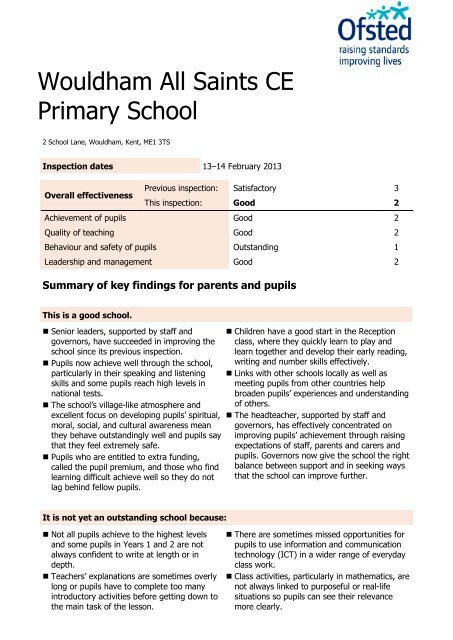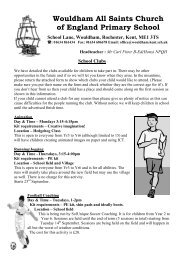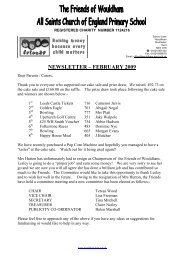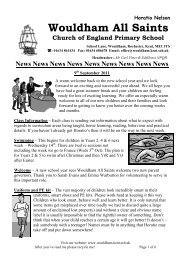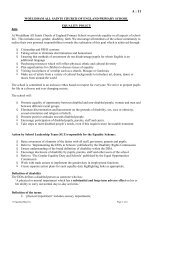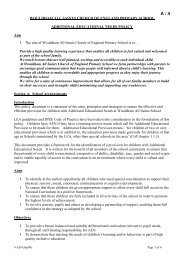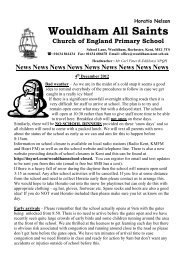OFSTED Report - Wouldham All Saints C of E Primary School
OFSTED Report - Wouldham All Saints C of E Primary School
OFSTED Report - Wouldham All Saints C of E Primary School
You also want an ePaper? Increase the reach of your titles
YUMPU automatically turns print PDFs into web optimized ePapers that Google loves.
<strong>Wouldham</strong> <strong>All</strong> <strong>Saints</strong> CE<br />
<strong>Primary</strong> <strong>School</strong><br />
2 <strong>School</strong> Lane, <strong>Wouldham</strong>, Kent, ME1 3TS<br />
Inspection dates 13–14 February 2013<br />
Overall effectiveness<br />
Previous inspection: Satisfactory 3<br />
This inspection: Good 2<br />
Achievement <strong>of</strong> pupils Good 2<br />
Quality <strong>of</strong> teaching Good 2<br />
Behaviour and safety <strong>of</strong> pupils Outstanding 1<br />
Leadership and management Good 2<br />
Summary <strong>of</strong> key findings for parents and pupils<br />
This is a good school.<br />
Senior leaders, supported by staff and<br />
governors, have succeeded in improving the<br />
school since its previous inspection.<br />
Pupils now achieve well through the school,<br />
particularly in their speaking and listening<br />
skills and some pupils reach high levels in<br />
national tests.<br />
The school’s village-like atmosphere and<br />
excellent focus on developing pupils’ spiritual,<br />
moral, social, and cultural awareness mean<br />
they behave outstandingly well and pupils say<br />
that they feel extremely safe.<br />
Pupils who are entitled to extra funding,<br />
called the pupil premium, and those who find<br />
learning difficult achieve well so they do not<br />
lag behind fellow pupils.<br />
Children have a good start in the Reception<br />
class, where they quickly learn to play and<br />
learn together and develop their early reading,<br />
writing and number skills effectively.<br />
Links with other schools locally as well as<br />
meeting pupils from other countries help<br />
broaden pupils’ experiences and understanding<br />
<strong>of</strong> others.<br />
The headteacher, supported by staff and<br />
governors, has effectively concentrated on<br />
improving pupils’ achievement through raising<br />
expectations <strong>of</strong> staff, parents and carers and<br />
pupils. Governors now give the school the right<br />
balance between support and in seeking ways<br />
that the school can improve further.<br />
It is not yet an outstanding school because:<br />
Not all pupils achieve to the highest levels<br />
and some pupils in Years 1 and 2 are not<br />
always confident to write at length or in<br />
depth.<br />
Teachers’ explanations are sometimes overly<br />
long or pupils have to complete too many<br />
introductory activities before getting down to<br />
the main task <strong>of</strong> the lesson.<br />
There are sometimes missed opportunities for<br />
pupils to use information and communication<br />
technology (ICT) in a wider range <strong>of</strong> everyday<br />
class work.<br />
Class activities, particularly in mathematics, are<br />
not always linked to purposeful or real-life<br />
situations so pupils can see their relevance<br />
more clearly.
Inspection report: <strong>Wouldham</strong> <strong>All</strong> <strong>Saints</strong> CE <strong>Primary</strong> <strong>School</strong>, 13–14 February 2013 2 <strong>of</strong> 9<br />
Information about this inspection<br />
The Inspector observed ten part lessons taught by five teachers, <strong>of</strong> which two were joint<br />
observations conducted with the headteacher. In addition, the inspector briefly observed<br />
activities such as the breakfast club and after-school Judo club.<br />
He listened to a sample <strong>of</strong> pupils read in Year 2 and Year 6 and observed playtime and<br />
lunchtime routines. He observed an assembly led by older pupils.<br />
Meetings were held with a representative group <strong>of</strong> pupils, the vice chair and another member <strong>of</strong><br />
the governing body, and staff, including those responsible for leading different subjects.<br />
Information was examined which related to pupils who may be disabled or who have special<br />
educational needs.<br />
The inspector took account <strong>of</strong> 34 responses to Ofsted’s online questionnaire (Parent View) and<br />
analysed questionnaires completed by 17 members <strong>of</strong> staff.<br />
The Inspector scrutinised a range <strong>of</strong> documents, including the school’s checks on teaching,<br />
governors’ visits and meetings, planning, internal pupil progress information and records relating<br />
to behaviour and attendance, together with documents relating to safeguarding.<br />
Inspection team<br />
Kevin Hodge, Lead inspector<br />
Additional inspector
Inspection report: <strong>Wouldham</strong> <strong>All</strong> <strong>Saints</strong> CE <strong>Primary</strong> <strong>School</strong>, 13–14 February 2013 3 <strong>of</strong> 9<br />
Full report<br />
Information about this school<br />
<strong>Wouldham</strong> is much smaller in size than most primary schools. The number <strong>of</strong> pupils attending<br />
has risen slightly since the previous inspection.<br />
A lower than average proportion <strong>of</strong> pupils are eligible for the pupil premium (funding for pupils<br />
known to be eligible for free school meals, looked after children and children from service<br />
families). The proportion <strong>of</strong> pupils identified who may be disabled or who have special<br />
educational needs is around average. This includes those supported at school action, school<br />
action plus or with a statement <strong>of</strong> special educational needs.<br />
Nearly all classes have pupils from more than one age group.<br />
The majority <strong>of</strong> pupils are White British and there are very few pupils from minority ethnic<br />
heritages. There are none at the early stages <strong>of</strong> learning English.<br />
The school has awards reflecting its commitment to promoting basic skills and pupils’ safety.<br />
None <strong>of</strong> the pupils are taught in alternative provision (other schools or units).<br />
The school meets the government’s current floor standards, which set the minimum<br />
expectations for pupils’ attainment and progress.<br />
What does the school need to do to improve further?<br />
Improve pupils’ learning and achievement to be at the highest levels by:<br />
− increasing the opportunities for pupils in Years 1 and 2 to write for sustained periods to<br />
improve pupils’ creativity and quality <strong>of</strong> unaided writing<br />
− ensuring pupils do not have too many steps to complete before they start on the main activity<br />
<strong>of</strong> the lesson and that pupils present their written work more carefully in Years 3 to 6<br />
− teachers ensuring that all activities are purposeful and relevant, such as mathematical skills<br />
being linked to real-life situations so pupils see their use in everyday life<br />
− using ICT more <strong>of</strong>ten in everyday activities to help extend pupils’ research, recording and<br />
presentational skills.
Inspection report: <strong>Wouldham</strong> <strong>All</strong> <strong>Saints</strong> CE <strong>Primary</strong> <strong>School</strong>, 13–14 February 2013 4 <strong>of</strong> 9<br />
Inspection judgements<br />
The achievement <strong>of</strong> pupils<br />
is good<br />
Children start school <strong>of</strong>ten with lower levels <strong>of</strong> ability than are typical for their age. They settle<br />
quickly, enjoy learning letter sounds and combinations (<strong>of</strong>ten known as phonics), making<br />
valentines cards, or ‘taking orders’ for the class restaurant. Having made good progress they<br />
start in their next class with skills and abilities close to those expected, particularly in their social<br />
and speaking skills.<br />
Pupils in Years 1 to 6 achieve well. Results have improved so that by the time they leave the<br />
school, pupils’ attainment in their English and mathematical work is securely in line with national<br />
averages. Some Year 6 pupils reached higher levels in their mathematics test.<br />
Pupils in Years 3 to 6 write for a range <strong>of</strong> purposes such as creating job adverts, writing about<br />
heroes and villains or in recounting the arrest <strong>of</strong> Guy Fawkes. Occasionally, pupils do not always<br />
present their work neatly. In Years 1 and 2, their past work indicates they do not always have<br />
enough chances to write longer pieces <strong>of</strong> work to really stretch their imagination or ability to<br />
write at length. Pupils <strong>of</strong> all ages are confident speakers.<br />
In mathematics, pupils have well-developed number and problem-solving skills, although<br />
activities, at times, are not always linked to everyday real-life situations to help pupils see how<br />
using these skills can be helpful and relevant.<br />
Reading standards by the end <strong>of</strong> Year 2 and Year 6 are average. Older pupils like recalling their<br />
favourite authors. Year 1 pupils were below average in the last national screening phonics check,<br />
despite pupils generally reading at the levels expected. As a result, the school has focused more<br />
directly in increasing pupils’ confidence to read unfamiliar words and letter combinations.<br />
Pupils achieve well in a wide variety <strong>of</strong> topic work, such as ‘space’ and ‘<strong>All</strong> creatures great and<br />
small’. The pupils’ good ICT skills are used in specific activities such as mathematics<br />
programmes, but opportunities to extend these skills in general day-to-day work are sometimes<br />
overlooked.<br />
Differences between boys’ and girls’ achievement are reducing quickly and very little difference<br />
was noticed in lessons or from past work. Disabled pupils and those who have special<br />
educational needs achieve well, as extra adult support, combined with well planned activities,<br />
enables them to achieve as equally well as others. Those who benefit from pupil premium<br />
funding also achieve well, so that any gaps between their average point scores and those <strong>of</strong><br />
other pupils are narrowing quickly.<br />
The quality <strong>of</strong> teaching<br />
is good<br />
Teaching is typically good. Relationships are excellent, pupils like their teachers and are very<br />
keen to work. In the mixed Reception/Year 1 class, children like discussing what to do, practising<br />
new letter sounds, constructing models to develop their coordination or knocking down skittles in<br />
the outside area to develop their counting.<br />
Reading is taught well through the school. Teachers have increased their focus on teaching<br />
letter sounds, as not all younger pupils were confident in tackling unfamiliar words in tests.<br />
Older pupils read confidently, enjoy recounting favourite stories and know a good range <strong>of</strong><br />
authors.<br />
Teachers plan for different activities, which are <strong>of</strong>ten practical and involve pupils in lots <strong>of</strong><br />
discussions with partners to boost their speaking skills. Pupils in Years 3 to 6 always know what<br />
they are doing in lessons, but not always why.<br />
Pupils’ write confidently, particularly in Years 3 to 6. On occasions, pupils in Years 1 and 2 do not<br />
have enough extended periods <strong>of</strong> time to write to extend their confidence.<br />
Pupils’ number and calculation skills are taught regularly, aided by pupils using computer<br />
programs to speed up their skills. On occasions, other mathematical activities are not always<br />
related to everyday problems. For example, pupils were accurate in working out angles in paper
Inspection report: <strong>Wouldham</strong> <strong>All</strong> <strong>Saints</strong> CE <strong>Primary</strong> <strong>School</strong>, 13–14 February 2013 5 <strong>of</strong> 9<br />
exercises, but were not very aware <strong>of</strong> how this knowledge might be useful in real life.<br />
Teachers’ explanations are clear, but occasionally not always concise. Some pupils, <strong>of</strong>ten those<br />
<strong>of</strong> higher ability, said they would like to get on more quickly, rather than complete introductory<br />
activities, as they understood the task.<br />
Staff foster pupils’ spiritual, moral, social, and cultural understanding well with frequent<br />
reminders about how to work together, valuing differences and in being patient with others.<br />
Teachers’ marking is frequent and helpful in showing pupils how to improve. Simple, but<br />
effective systems for pupils to record their level <strong>of</strong> understanding help the teacher gauge their<br />
progress.<br />
Additional adults support learning effectively. They are well prepared, work closely with the class<br />
teacher and have a good understanding <strong>of</strong> how to move pupils’ learning on during the lesson.<br />
The behaviour and safety <strong>of</strong> pupils<br />
are outstanding<br />
Pupils are brilliantly behaved and really feel that the small village atmosphere created enables<br />
them all to feel extremely safe and well cared for. Pupils say that dips in behaviour are<br />
extremely rare and know that bullying, in any form such as cyber, name calling or racism, is<br />
almost unheard <strong>of</strong>.<br />
This improved level <strong>of</strong> behaviour reflects the school’s determination to foster pupils’ spiritual,<br />
moral, social and cultural development to high levels. Pupils play very harmoniously together and<br />
live up to the school’s distinctive Christian values. In an assembly, older pupils very sensitively<br />
took charge <strong>of</strong> telling a biblical story, involved other pupils in acting it out and in leading prayers.<br />
The school council is extremely keen and effective in influencing improvements within the school<br />
such as succeeding in getting better playground equipment, revision <strong>of</strong> lunchtime rules, the<br />
provision <strong>of</strong> new books and more trips out <strong>of</strong> school.<br />
‘Superheroes’, those pupils who help playtimes run more smoothly, are highly valued as they<br />
succeed in making sure equipment is equally available and resolve any difficulties before they<br />
become serious.<br />
Pupils’ excellent behaviour permeates throughout the school and in lessons, although sometimes<br />
teachers do not always take the fullest advantage <strong>of</strong> pupils’ enthusiasm to learn quickly,<br />
independently or with minimal supervision.<br />
Early morning breakfast club helps those who attend feel ready for school and a range <strong>of</strong> afterschool<br />
clubs helps broaden pupils’ activity levels and experience. Parents and carers say their<br />
children enjoy school, reinforced by those spoken to who attended the school’s open evening.<br />
The leadership and management<br />
are good<br />
A focus on raising pupils’ achievement, while fostering high levels <strong>of</strong> pupils’ behaviour and care<br />
for others, has been a key factor in the school’s improved performance.<br />
Staff say they feel part <strong>of</strong> a close team and confirm that pupils’ behaviour is typically excellent.<br />
Checks on the quality <strong>of</strong> teaching are regular and the school has ensured that the teachers’<br />
performance is linked to salary progression and promotion. Occasionally however, observations<br />
carried out focus more on what the teacher does, rather than how pupils learn, which is<br />
necessary in order to raise their achievement to the highest levels.<br />
The subjects and wider activities taught (<strong>of</strong>ten known as the curriculum) develop pupils’<br />
spiritual, moral, social and cultural awareness extremely well. These aspects thread through<br />
lessons, assemblies and clearly taught Christian values and help ensure pupils behave brilliantly.<br />
There are still some subjects, such as ICT and mathematics, which the school recognises as<br />
needing ‘fine-tuning’ so they really help stretch pupils’ learning to the highest level.<br />
Links with parents and carers are very positive and Ofsted’s Parent View questionnaire confirmed<br />
a high level <strong>of</strong> satisfaction. Those spoken to during the inspection described school as ‘excellent’,<br />
‘really good’ and ‘supportive’.
Inspection report: <strong>Wouldham</strong> <strong>All</strong> <strong>Saints</strong> CE <strong>Primary</strong> <strong>School</strong>, 13–14 February 2013 6 <strong>of</strong> 9<br />
The local authority’s regular and perceptive support has aided the school’s improvement over<br />
time. Links with other schools locally have been helpful in supporting training and widening<br />
training opportunities.<br />
The governance <strong>of</strong> the school:<br />
− Governors reviewed their organisation and reallocated responsibilities following the previous<br />
inspection and now successfully provide the right balance between support and challenge to<br />
senior leaders. Their regular and informative visits provide them with enough information to<br />
gauge the progress <strong>of</strong> initiatives and understand the link between the performance <strong>of</strong><br />
teachers, posts <strong>of</strong> responsibility and salary progression. Regular training gives them a good<br />
understanding <strong>of</strong> how results from national tests compare to those <strong>of</strong> other schools. Governors<br />
are also conscientious in ensuring that those pupils entitled to extra funding, known as the<br />
pupil premium, have higher levels <strong>of</strong> support within lessons and increased resources. They<br />
also understand that the extra support should result in pupils making better progress in their<br />
learning. Governors ensure that safeguarding policies and procedures, such as checks on staff<br />
appointments, meet statutory requirements and they do not tolerate discrimination <strong>of</strong> any sort<br />
and ensure that equal opportunities are provided for all pupils.
Inspection report: <strong>Wouldham</strong> <strong>All</strong> <strong>Saints</strong> CE <strong>Primary</strong> <strong>School</strong>, 13–14 February 2013 7 <strong>of</strong> 9<br />
What inspection judgements mean<br />
<strong>School</strong><br />
Grade Judgement Description<br />
Grade 1 Outstanding An outstanding school is highly effective in delivering outcomes<br />
that provide exceptionally well for all its pupils’ needs. This ensures<br />
that pupils are very well equipped for the next stage <strong>of</strong> their<br />
education, training or employment.<br />
Grade 2 Good A good school is effective in delivering outcomes that provide well<br />
for all its pupils’ needs. Pupils are well prepared for the next stage<br />
<strong>of</strong> their education, training or employment.<br />
Grade 3<br />
Grade 4<br />
Requires<br />
improvement<br />
Inadequate<br />
A school that requires improvement is not yet a good school, but it<br />
is not inadequate. This school will receive a full inspection within<br />
24 months from the date <strong>of</strong> this inspection.<br />
A school that has serious weaknesses is inadequate overall and<br />
requires significant improvement but leadership and management<br />
are judged to be Grade 3 or better. This school will receive regular<br />
monitoring by Ofsted inspectors.<br />
A school that requires special measures is one where the school is<br />
failing to give its pupils an acceptable standard <strong>of</strong> education and<br />
the school’s leaders, managers or governors have not<br />
demonstrated that they have the capacity to secure the necessary<br />
improvement in the school. This school will receive regular<br />
monitoring by Ofsted inspectors.
Inspection report: <strong>Wouldham</strong> <strong>All</strong> <strong>Saints</strong> CE <strong>Primary</strong> <strong>School</strong>, 13–14 February 2013 8 <strong>of</strong> 9<br />
<strong>School</strong> details<br />
Unique reference number 118634<br />
Local authority<br />
Kent<br />
Inspection number 401773<br />
This inspection <strong>of</strong> the school was carried out under section 5 <strong>of</strong> the Education Act 2005.<br />
Type <strong>of</strong> school<br />
<strong>Primary</strong><br />
<strong>School</strong> category<br />
Community<br />
Age range <strong>of</strong> pupils 4–11<br />
Gender <strong>of</strong> pupils<br />
Mixed<br />
Number <strong>of</strong> pupils on the school roll 127<br />
Appropriate authority<br />
The governing body<br />
Chair<br />
Lesley Huttton<br />
Headteacher<br />
Carl Fitter<br />
Date <strong>of</strong> previous school inspection 10–11 November 2009<br />
Telephone number 01634 861434<br />
Fax number 01634 686678<br />
Email address<br />
headteacher@wouldham.kent.sch.gov.uk
Any complaints about the inspection or the report should be made following the procedures set out in the<br />
guidance ‘raising concerns and making complaints about Ofsted', which is available from Ofsted’s website:<br />
www.<strong>of</strong>sted.gov.uk. If you would like Ofsted to send you a copy <strong>of</strong> the guidance, please telephone 0300<br />
123 4234, or email enquiries@<strong>of</strong>sted.gov.uk.<br />
You can use Parent View to give Ofsted your opinion on your child’s school. Ofsted<br />
will use the information parents and carers provide when deciding which schools to<br />
inspect and when and as part <strong>of</strong> the inspection.<br />
You can also use Parent View to find out what other parents and carers think about<br />
schools in England. You can visit www.parentview.<strong>of</strong>sted.gov.uk, or look for the link<br />
on the main Ofsted website: www.<strong>of</strong>sted.gov.uk<br />
The Office for Standards in Education, Children's Services and Skills (Ofsted) regulates and inspects to<br />
achieve excellence in the care <strong>of</strong> children and young people, and in education and skills for learners<br />
<strong>of</strong> all ages. It regulates and inspects childcare and children's social care, and inspects the Children<br />
and Family Court Advisory Support Service (Cafcass), schools, colleges, initial teacher training, workbased<br />
learning and skills training, adult and community learning, and education and training in<br />
prisons and other secure establishments. It assesses council children’s services, and inspects services<br />
for looked after children, safeguarding and child protection.<br />
Further copies <strong>of</strong> this report are obtainable from the school. Under the Education Act 2005, the school<br />
must provide a copy <strong>of</strong> this report free <strong>of</strong> charge to certain categories <strong>of</strong> people. A charge not<br />
exceeding the full cost <strong>of</strong> reproduction may be made for any other copies supplied.<br />
If you would like a copy <strong>of</strong> this document in a different format, such as large print or Braille, please<br />
telephone 0300 123 4234, or email enquiries@<strong>of</strong>sted.gov.uk.<br />
You may copy all or parts <strong>of</strong> this document for non-commercial educational purposes, as long as you<br />
give details <strong>of</strong> the source and date <strong>of</strong> publication and do not alter the information in any way.<br />
To receive regular email alerts about new publications, including survey reports and school inspection<br />
reports, please visit our website and go to ‘Subscribe’.<br />
Piccadilly Gate<br />
Store St<br />
Manchester<br />
M1 2WD<br />
T: 0300 123 4234<br />
Textphone: 0161 618 8524<br />
E: enquiries@<strong>of</strong>sted.gov.uk<br />
W: www.<strong>of</strong>sted.gov.uk<br />
© Crown copyright 2013


